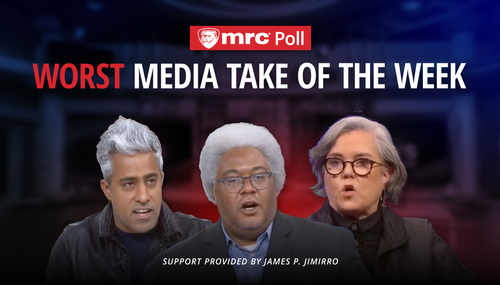On April 5, Politifact, the website which uses "fact-checking" as a shield to advance a left-supporting, right-bashing "truth squad" agenda, decided that "Revisiting the Obama track record on Syria’s chemical weapons" was necessary. I'll say.
But the problem isn't, as the website's Jon Greenberg claims, that "Given recent events ... we now have many unanswered questions."
The problem is that he originally had no genuine basis for evaluating Obama Secretary of State John Kerry's July 20, 2014 assertion on NBC's Meet the Press — that "We got '100 percent' of chemical weapons out of Syria" — as "Mostly True."
<<< Please support MRC's NewsBusters team with a tax-deductible contribution today. >>>
A visit to that program's transcript indicates that Kerry also made a prior statement that day that "Russia has been constructive in helping to remove 100% of the declared chemical weapons from Syria." So this post will evaluate Kerry's claim on that basis.
Greenberg's original evaluation admitted to weaknesses which should have dictated that Kerry's contention remain "unproven" at the time, and perhaps even be seen as "False" (bolds are mine, and indicate remaining uncertainty at the time; italicized text indicating accurate evaluations is mine):
With key help from Russia, Syria agreed to rid itself of all chemical weapons by the end of June 2014.
It was an ambitious goal, particularly in the middle of a civil war. And in large measure, it was met.
The U.S. State Department pointed us to this statement from Ahmet Üzümcü, director general of the Organization for the Prohibition of Chemical Weapons, the United Nations body in charge of inspections and disposal. On June 24, 2014, Üzümcü declared a major benchmark had been cleared.
"The last of the remaining chemicals identified for removal from Syria were loaded this afternoon aboard the Danish ship Ark Futura," Üzümcü said.
Paul Walker, a long-time chemical weapons inspector with the Green Cross, an independent security group, called this an historic accomplishment. Walker said there are ongoing negotiations over some discrepancies in Syria’s disclosure declarations but he said that is not unusual. (i.e., unproven)
Potentially more significant are two declared stockpile sites, which have yet to be inspected (i.e., unproven), Walker said. Also, some remaining sites need attention, he said. (i.e., unproven)
"There are still 12 former chemical weapon production facilities which need to be destroyed," (i.e., unproven) Walker said.
The Organization for the Prohibition of Chemical Weapons said Syria had agreed to measures to deal with some of those facilities, but not all (i.e., unproven). A further mission was underway.
That makes five bolded statements which show that the process was not complete, and that Kerry's "100 percent" contention was clearly premature, even if one limits it to "declared" chemical weapons as he intended.
 Further, but not directly involved in the evaluation of Kerry's statements, the continued existence of production facilities was still in doubt. If any of them survived, the Syrian regime's ability to revive a chemical weapons program would obviously still be in place, and their existence would certainly run counter to any genuine intent to rid Syria of all chemical weapons long-term.
Further, but not directly involved in the evaluation of Kerry's statements, the continued existence of production facilities was still in doubt. If any of them survived, the Syrian regime's ability to revive a chemical weapons program would obviously still be in place, and their existence would certainly run counter to any genuine intent to rid Syria of all chemical weapons long-term.
It shouldn't need to be said, but given his original post, it apparently does: If any of the unproven items noted above were ultimately not resolved, and if it can be shown that any of those failures to resolve enabled Syrian President Bashir Assad to hang onto remnants of his "declared" chemical weapons, Greenberg's "Mostly True" evaluation becomes "False" — proving that he had no justification for his "Mostly True" evaluation in the first place.
As best as one can tell, Greenberg made no visible attempts during the ensuing 32 months to determine the status of the clearly unproven items noted above. Apparently, he didn't think he needed to — because, after all, because he had decided that what Kerry said in July 2014 was "Mostly True."
Events subsequent to Greenberg's 2014 evaluation but occurring prior to Syria's chemical weapons attack early last week, and acknowledged in his April 5 post, should have caused him to revisit his evaluation long ago (link is in original):
... international investigators concluded last year that the Syrian government had gamed the system.In October 2016, a joint effort by the United Nations and the Organization for the Prohibition of Chemical Weapons reported that Syrian Arab Armed Forces had dropped chemical-laden bombs four times between 2014 and 2015. (That conclusive evidence was not available at the time of the original fact-check. One of our principles is that we rate statements based on what is known at the time.)
Consistent with Politifact's (cough, cough) "principles," once the facts of those "chemical-laden bombs" became known and officially recognized, Greenberg should have withdrawn his July 2014 "Mostly True" evaluation, which had no genuine justification in the first place, six months ago, if not earlier.
Why didn't he? Was he oblivious to these events, or did he decide that he wouldn't do anything until his error became too obvious and humiliating to ignore?
Don't hold your breath waiting for an explanation.
Cross-posted at BizzyBlog.com.




